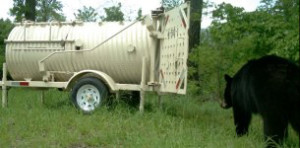 FRANKLIN, Pa. (EYT) — Bears love bird seed and this time of year, their desire for it can land them in trouble at times.
FRANKLIN, Pa. (EYT) — Bears love bird seed and this time of year, their desire for it can land them in trouble at times.
Jim Hedglin lives just outside of Polk, and he had recently begun having some issues with a large, male black bear, weighing at least 500 pounds, that was coming into his yard from a nearby swamp to raid the bird feeders and root around in the yard.
Hedglin, concerned the bear may harm his black Labs, called the Pa. Game Commission. Jason Armory, a Wildlife Conservation Officer, came to Hedglin’s property last week and set up a culvert trap, baited with old donuts. The trap is actually a piece of culvert pipe with a sliding door and mounted on wheels for easy transportation.
The bear avoided the trap for the first few nights before Armory reset the trap on Monday. By Tuesday night, the bear was in the trap after a brief confrontation with Hedglin’s dogs. Hodgkin brought his dogs inside, and then the bear made its way to the trap, which was near the bird feeder that it had been raiding.

On Wednesday, Armory arrived and gave the bear a tranquilizer to relax it for the 50-plus mile road to be released outside of Marienville in the Allegheny National Forest.
The tranquilizer put the bear into an extreme state of relaxation, but not unconsciousness. The reason for moving the bear so far is due to the fact that males have a large home range, sometimes up to 66 square miles, and the fact that their ability to return to an area they prefer is extraordinary.
The State Game Commission estimates there are nearly 20,000 black bears in Pennsylvania. Bears are omnivores, which means their diet may include just about anything.
Until certain food sources become available, bears will often target bird feeders, garbage, and other easy-to-get food.
Pa. Game Commission figures say 50 percent of all bear conflicts involve bird feeders while 40 percent involve garbage.
According to the Game Commission, here are some ways to reduce a bear’s attraction to your property:
• Put bird feeders and seed away or keep it inside at night. Birds don’t need supplemental feeding in the spring and summer months;
• Keep garbage inside until trash day. Wait until the morning of pick-up to put garbage out. Try to keep the trash inside, in a garage or shed. It is also a good idea to put ammonia, bleach or powdered garden lime in the bags. This will help eliminate the odors and give the trash a bad smell or taste to the bear;
• Don’t leave extra pet food outside;
- Burn off all grease and food on the grill.
If you have tried the aforementioned deterrents, and a bear still frequents your property, or, if a bear is acting aggressively or damaging property, you may want to call the Game Commission. The agency may deem the bear a candidate to trap and relocate.
Region office contact information can be found here: http://bit.ly/ROffice.
Trapping bears is a last solution because it does not always work. Some bears will not go into traps because they have been caught before or are just naturally wary of them. If the bear is caught and relocated, it will often make its way back, even if it is moved several miles away.
When relocating bears, wildlife conservation officers try not to take them across major highways because if the bear attempts to go back it has a greater chance of getting hit on the highway. This limits the traveled distance and locations for appropriate releases. Bear relocations may also result in the bear causing conflicts in the area where it was released.
Copyright © 2024 EYT Media Group, Inc. All rights reserved. Any copying, redistribution or retransmission of the contents of this service without the express written consent of EYT Media Group, Inc. is expressly prohibited.








